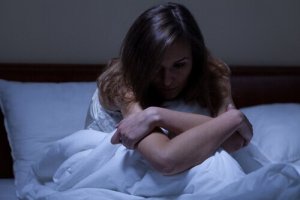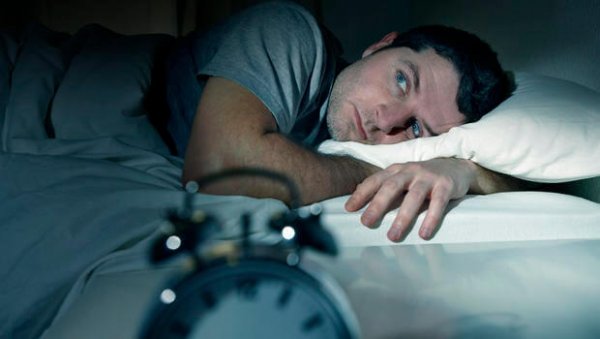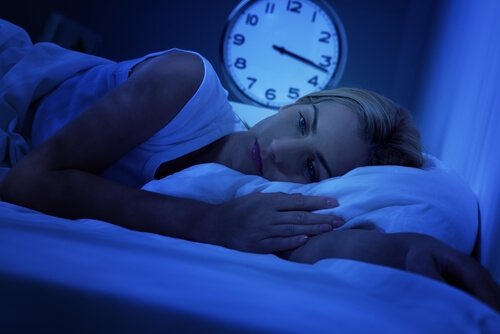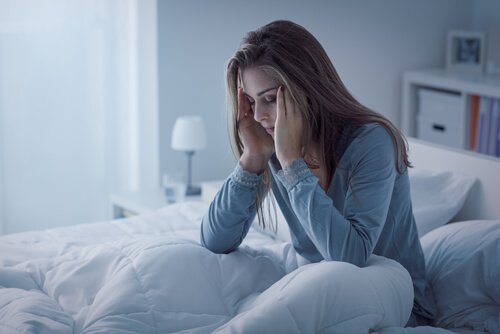Types of Insomnia: Causes and Treatment

When we have trouble sleeping, we tend to think we have insomnia. Did you know that there are different types of insomnia? Actually, each one of them requires a different treatment. In this article, we’ll focus on the different types of insomnia and their treatment.
Insomnia is one of the main reasons why people go to primary healthcare and it’s a symptom of almost all psychological disorders.
Just like it happens with other common mental health issues (like anxiety and depression), many people use the term insomnia incorrectly. For example, having trouble falling asleep for one or two days can’t be considered insomnia. Being stressed out and not being able to sleep well isn’t insomnia either. In the latter case, insomnia is just the symptom of a stress episode.

Types of insomnia
Insomnia is formally denominated primary insomnia, a sleep disorder with the following symptoms:
- Difficulty falling asleep for at least four weeks.
- Sleep problems which appear while one is attempting to fall asleep, during sleep, or in the final sleep stages. Also, feeling like one didn’t get a good night’s sleep.
- There’s no apparent cause (traumatic brain injury, dementia, or stroke) that can explain the sleep disorder (such as drug consumption, medication for certain conditions, an illness, etc.).
- There’s no sign of a psychological disorder such as anxiety or depression.
There are three types of insomnia:
- Sleep-onset insomnia, which is difficulty falling asleep at the beginning of the night.
- Sleep-maintenance insomnia or fragmented sleep.
- Late insomnia or early morning wakening insomnia.
Therefore, in order to be correctly diagnosed with insomnia, you must meet the criteria mentioned above. If you have any other problem that can cause insomnia, just treating the insomnia won’t solve the issue. You must make sure you’re addressing the main disorder in order to reduce your sleep problems. Let’s delve a little deeper into the types of insomnia.
Sleep-onset insomnia
This is the most common type of insomnia. It’s the inability to fall asleep when you go to bed. If you spend the day stressed out and worried, it’ll be very hard for your mind to disconnect and enter sleep mode.
In most cases, sleep-onset insomnia is the body’s response to psychological discomfort, which is the real cause of the inability to fall asleep. However, you may also experience these problems when you change your sleeping schedule.
“Finish each day before you begin the next, and interpose a solid wall of sleep between the two.”
-Ralph Waldo Emerson-

Treatment for sleep-onset insomnia
The recommended treatment for sleep-onset insomnia has different phases. First, you must start with sleep hygiene. When most people develop insomnia, they adopt unhealthy habits that worsen the sleep disorder. Therefore, as a first measure, the person must follow certain guidelines to set proper habits and break the usual association: going to bed → not sleeping → anxiety due to the fact that they can’t fall asleep.
Secondly, if the sleep hygiene guidelines don’t help, the affected person must resort to other techniques. Said techniques aim to break the link between bedtime and the inability to fall asleep, as well as the uneasiness it causes.
For each case, psychologists design specific techniques and set certain goals so the person can make changes. However, all therapeutic approaches aim to treat sleep-onset insomnia as the primary disorder. Thus, those treatments are only applied once other sleeping or psychological disorders, like anxiety, depression, OCD, or bipolar disorder, have been ruled out.
On the other hand, if a patient still can’t sleep after resorting to psychological techniques, then medication is the next step. The best option to treat sleep-onset insomnia is with sleep aids like nonbenzodiazepines. These are psychoactive drugs that act very quickly and in a short period of time without having any anxiolytic or residual effects.
In any case, a doctor must always supervise treatment with such medications. They will decide which drug is better for each person and for how long a patient must take it.
Fragmented sleep or sleep-maintenance insomnia
Sleep-maintenance insomnia is the difficulty staying asleep at night. In other words, a person who suffers from this type of insomnia is able to fall asleep but then frequently wakes up in the middle of the night and can’t fall asleep again. This makes the person who suffers from it feel really unrested.
To diagnose sleep-maintenance insomnia, the specialist must rule out organic and physiological factors that may be causing it. For example, hormonal changes that can make the person wake up suddenly.
Waking up in the middle of the night is very common when the thyroid gland isn’t working properly or, in the case of women, when there are changes in their hormonal cycle.

Treatment for sleep-maintenance insomnia
If any other health issues are causing sleep-maintenance insomnia, they should be addressed first. Once they’ve been controlled or ruled out, the treatment for this type of insomnia is basically the same as for sleep-onset insomnia.
In this case, the recommended medication is a type of benzodiazepine that acts throughout the night and lets the patient sleep without interruptions. Furthermore, there is no effective psychological treatment to reduce fragmented sleep. However, the role of a psychologist is fundamental.
Most people with fragmented sleep also have psychological problems like major depressive disorder. Therefore, the short-term priority is for the patient to be able to sleep properly and then the goal is to address the psychological aspects that cause their insomnia through therapy.
Late insomnia or early morning wakening insomnia
People with this type of insomnia are able to fall asleep and don’t wake up in the middle of the night, but can’t sleep for more than a couple of hours. For example, they set their alarm to go off at 7:00 a.m. but wake up at 5:00 a.m. and can’t fall back asleep. This makes them feel tired, anxious, or sleepy throughout the day.
Early morning wakening insomnia could be caused by depression and work-related stress. Depression can cause changes in sleep cycles that result in the person waking up before they should and having trouble falling asleep again. Also, a person may suffer from this when their workload increases.

Treatment for late insomnia
The treatment consists of a combination of medication to prevent the person from waking up early and psychological treatment to manage their emotions.
The psychological approach is similar to that of the other types of insomnia but, in this case, it’s necessary to tackle stress and emotions.
Although it may seem odd, if you wake up earlier than you should and can’t go back to sleep, you should get up from your bed. This will help you feel more tired and, therefore, it’s a very effective technique to help you fall asleep. Plus, you’ll break the link between being in bed and the anxious feeling of not being able to sleep.
While the treatment for sleep-onset insomnia is mainly psychological, a combination of medication and therapy is a better option for both sleep-maintenance insomnia and late insomnia.
When we have trouble sleeping, we tend to think we have insomnia. Did you know that there are different types of insomnia? Actually, each one of them requires a different treatment. In this article, we’ll focus on the different types of insomnia and their treatment.
Insomnia is one of the main reasons why people go to primary healthcare and it’s a symptom of almost all psychological disorders.
Just like it happens with other common mental health issues (like anxiety and depression), many people use the term insomnia incorrectly. For example, having trouble falling asleep for one or two days can’t be considered insomnia. Being stressed out and not being able to sleep well isn’t insomnia either. In the latter case, insomnia is just the symptom of a stress episode.

Types of insomnia
Insomnia is formally denominated primary insomnia, a sleep disorder with the following symptoms:
- Difficulty falling asleep for at least four weeks.
- Sleep problems which appear while one is attempting to fall asleep, during sleep, or in the final sleep stages. Also, feeling like one didn’t get a good night’s sleep.
- There’s no apparent cause (traumatic brain injury, dementia, or stroke) that can explain the sleep disorder (such as drug consumption, medication for certain conditions, an illness, etc.).
- There’s no sign of a psychological disorder such as anxiety or depression.
There are three types of insomnia:
- Sleep-onset insomnia, which is difficulty falling asleep at the beginning of the night.
- Sleep-maintenance insomnia or fragmented sleep.
- Late insomnia or early morning wakening insomnia.
Therefore, in order to be correctly diagnosed with insomnia, you must meet the criteria mentioned above. If you have any other problem that can cause insomnia, just treating the insomnia won’t solve the issue. You must make sure you’re addressing the main disorder in order to reduce your sleep problems. Let’s delve a little deeper into the types of insomnia.
Sleep-onset insomnia
This is the most common type of insomnia. It’s the inability to fall asleep when you go to bed. If you spend the day stressed out and worried, it’ll be very hard for your mind to disconnect and enter sleep mode.
In most cases, sleep-onset insomnia is the body’s response to psychological discomfort, which is the real cause of the inability to fall asleep. However, you may also experience these problems when you change your sleeping schedule.
“Finish each day before you begin the next, and interpose a solid wall of sleep between the two.”
-Ralph Waldo Emerson-

Treatment for sleep-onset insomnia
The recommended treatment for sleep-onset insomnia has different phases. First, you must start with sleep hygiene. When most people develop insomnia, they adopt unhealthy habits that worsen the sleep disorder. Therefore, as a first measure, the person must follow certain guidelines to set proper habits and break the usual association: going to bed → not sleeping → anxiety due to the fact that they can’t fall asleep.
Secondly, if the sleep hygiene guidelines don’t help, the affected person must resort to other techniques. Said techniques aim to break the link between bedtime and the inability to fall asleep, as well as the uneasiness it causes.
For each case, psychologists design specific techniques and set certain goals so the person can make changes. However, all therapeutic approaches aim to treat sleep-onset insomnia as the primary disorder. Thus, those treatments are only applied once other sleeping or psychological disorders, like anxiety, depression, OCD, or bipolar disorder, have been ruled out.
On the other hand, if a patient still can’t sleep after resorting to psychological techniques, then medication is the next step. The best option to treat sleep-onset insomnia is with sleep aids like nonbenzodiazepines. These are psychoactive drugs that act very quickly and in a short period of time without having any anxiolytic or residual effects.
In any case, a doctor must always supervise treatment with such medications. They will decide which drug is better for each person and for how long a patient must take it.
Fragmented sleep or sleep-maintenance insomnia
Sleep-maintenance insomnia is the difficulty staying asleep at night. In other words, a person who suffers from this type of insomnia is able to fall asleep but then frequently wakes up in the middle of the night and can’t fall asleep again. This makes the person who suffers from it feel really unrested.
To diagnose sleep-maintenance insomnia, the specialist must rule out organic and physiological factors that may be causing it. For example, hormonal changes that can make the person wake up suddenly.
Waking up in the middle of the night is very common when the thyroid gland isn’t working properly or, in the case of women, when there are changes in their hormonal cycle.

Treatment for sleep-maintenance insomnia
If any other health issues are causing sleep-maintenance insomnia, they should be addressed first. Once they’ve been controlled or ruled out, the treatment for this type of insomnia is basically the same as for sleep-onset insomnia.
In this case, the recommended medication is a type of benzodiazepine that acts throughout the night and lets the patient sleep without interruptions. Furthermore, there is no effective psychological treatment to reduce fragmented sleep. However, the role of a psychologist is fundamental.
Most people with fragmented sleep also have psychological problems like major depressive disorder. Therefore, the short-term priority is for the patient to be able to sleep properly and then the goal is to address the psychological aspects that cause their insomnia through therapy.
Late insomnia or early morning wakening insomnia
People with this type of insomnia are able to fall asleep and don’t wake up in the middle of the night, but can’t sleep for more than a couple of hours. For example, they set their alarm to go off at 7:00 a.m. but wake up at 5:00 a.m. and can’t fall back asleep. This makes them feel tired, anxious, or sleepy throughout the day.
Early morning wakening insomnia could be caused by depression and work-related stress. Depression can cause changes in sleep cycles that result in the person waking up before they should and having trouble falling asleep again. Also, a person may suffer from this when their workload increases.

Treatment for late insomnia
The treatment consists of a combination of medication to prevent the person from waking up early and psychological treatment to manage their emotions.
The psychological approach is similar to that of the other types of insomnia but, in this case, it’s necessary to tackle stress and emotions.
Although it may seem odd, if you wake up earlier than you should and can’t go back to sleep, you should get up from your bed. This will help you feel more tired and, therefore, it’s a very effective technique to help you fall asleep. Plus, you’ll break the link between being in bed and the anxious feeling of not being able to sleep.
While the treatment for sleep-onset insomnia is mainly psychological, a combination of medication and therapy is a better option for both sleep-maintenance insomnia and late insomnia.
This text is provided for informational purposes only and does not replace consultation with a professional. If in doubt, consult your specialist.







